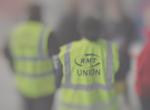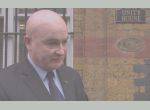Rail unions, transport campaigners and passenger groups are holding a national day of action today (Tuesday) to protest against massive hikes in rail fares and cuts to railway staff and services.
UK rail passengers pay among the highest fares in Europe for train travel. Following last year’s inflation-busting fare rises, the government has announced that train operating companies (TOCs) will be able to increase rail fares by three per cent more than RPI inflation. This could mean price hikes on most rush hour travel, season tickets and off-peak fares on the majority of intercity journeys.
The government has also given TOCs the power to increase some fares by even more than this, as long as the overall cost of fares stays within the cap. This could allow operators to charge passengers up to 11 per cent more for train travel from January 2013.
At the same time, the government’s Rail Command Paper has set out proposals for TOCs to shed thousands of station staff, guards, catering staff and ticket offices to slash costs. The government is asking TOCs and Network Rail to implement cost-cutting proposals in Sir Roy McNulty’s Rail Value for Money Study that could put up to 20,000 jobs at risk in the rail industry.
In a test case for the industry, train operator London Midland has submitted proposals for closures and reductions in operating hours of more than 80 ticket offices on its network, leaving many stations devoid of staff. Both unions and campaigners fear that the Secretary of State for Transport Justine Greening may give the green light to these proposals shortly.
In addition to causing some of the highest rail fares in Europe, privatisation has doubled the taxpayer subsidy to the rail industry. In its report
Rebuilding Rail, Transport for Quality of Life shows that more than £1bn per year is now incurred in extra costs as a result of the fragmentation, transaction costs, leakages through profits and dividend payments and other on-costs resulting from rail privatisation.
Transport for Quality of Life believes that eliminating these costs through integrating rail under public ownership could equate to an across the board fare reduction of 18 per cent.
Today (Tuesday) sees the publication of the RPI inflation figure that will be used to calculate rail fare increases from January next year. Action for Rail, Bring Back British Rail, Campaign for Better Transport and Climate Rush will take part in a national day of action including demonstrations at Waterloo Station in London and leafleting and protests at over 40 stations around the country.
TUC Deputy General Secretary
Frances O’Grady said: “These fare rises will add even more pressure to passengers already feeling a massive squeeze on their incomes.
”The government is asking train operators to make cuts to staff on trains, stations and in ticket offices while continuing to receive public subsidy and give millions in dividends to shareholders.
“Passengers are being asked to pay more to get less. We want cuts to rail fares, not rail staff.”
RMT General Secretary
Bob Crow said: “Passengers will be rightly angry when they find out the full extent of the inflation-busting fare increases imposed on them by government diktat. The idea that this extra money will be invested in the railways is a sick joke, it will simply be trousered by the greedy train operators, same as it always has been since privatisation.
“The case for renationalising our railways, and throwing the extortionists and rip-off merchants off the tracks, is now overwhelming. The public is sick and tired of being charged through the nose to travel on creaking, overcrowded trains while the rail companies are robbing them blind. The campaign to Bring Back British Rail is an idea whose time has come.”
Bring Back British Rail spokesperson
Ellie Harrison said: “It’s obvious that people are angry and frustrated with the railway system in this country since it was dismantled and sold off in the 1990s, and these extortionate train fare rises will only make this situation worse. We need a radical rethink of the way our railways are run so that passengers can, once again, take priority over profits.”
Climate Rush spokesperson
Siobhan Grimes said: “Affordable rail fares are essential in getting more people using trains and out of cars and planes. Travelling by train helps to tackle the toxic levels of air pollution in cities throughout the UK and reduces our carbon emissions too. Instead of pricing commuters off the railways, we must make green transport choices possible.”
- Press releases on this site are taken from www.rmt.org.uk.
- 9709 reads
> RMT National News
- 1 of 12
- next ›





